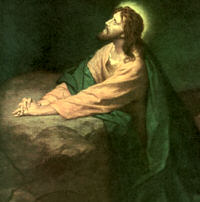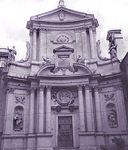From CatholicCulture.org:

Daily Readings for:March 28, 2012
Move to: Previous Day | Next Day

The most comprehensive treatment of the Liturgical Year available online: daily reflections, saints, seasons, calendars, prayers, activities, and recipes.

Daily Readings for:March 28, 2012
(Readings on USCCB website)
Collect: Enlighten, O God of compassion, the hearts of your children, sanctified by penance, and in your kindness grant those you stir to a sense of devotion a gracious hearing when they cry out to you. Through our Lord Jesus Christ, your Son, who lives and reigns with you in the unity of the Holy Spirit, one God, for ever and ever.
- None
- Prayer for the Fifth Week of Lent
- Lent Table Blessing 1
- Roman Ritual Blessing Before and After Meals: Lent (2nd Plan)
- None
RECIPES
ACTIVITIES
PRAYERS
LIBRARY
Lent: March 28th

 Wednesday of the Fifth Week of LentOld Calendar: St. John of Capistrano, confessor
Wednesday of the Fifth Week of LentOld Calendar: St. John of Capistrano, confessor
Move to: Previous Day | Next Day
"There were many lepers in Israel at the time of Eliseus the prophet, and none of them was cleansed but Naaman the Syrian." Naaman's cure, an anticipatory figure of baptism, also declares in advance the universality of salvation. Naaman was the Syrian general who, in obedience to the commands of Eliseus, was cured of leprosy by bathing in the Jordan. At a later date Jesus Himself was to receive in the waters of the Jordan the baptism of John the Baptist. Let us always keep in mind that repentance and a humble confession of our guilt will draw upon us the mercy of God and infuse into our hearts the hope of pardon.
According to the 1962 Missal of Bl. John XXIII the Extraordinary Form of the Roman Rite, today is the feast of St. John of Capistrano whose feast is celebrated in the Ordinary Form of the Roman Rite on October 23.
The Need for Mortification Today
Lent is essentially a time of prayer and mortification. The body which has been indulged for so many months must now be denied. Even though fasting and abstinence are impossible for some of us, the penitential spirit may not be shirked. Modern creeds approximate more and more the pagan conception of man, and the penitential spirit is, of course, unbearable to those whose only philosophy of life is the song of the banqueter: "Let us eat, drink and be merry, for tomorrow we die."
Lent is essentially a time of prayer and mortification. The body which has been indulged for so many months must now be denied. Even though fasting and abstinence are impossible for some of us, the penitential spirit may not be shirked. Modern creeds approximate more and more the pagan conception of man, and the penitential spirit is, of course, unbearable to those whose only philosophy of life is the song of the banqueter: "Let us eat, drink and be merry, for tomorrow we die."
Modern civilization scoffs at the notion of doing penance as if it were a vice of the pietist who wants to exalt one side of his nature at the expense of the other, although it is no small thing that the soul should be king of the body. Penance has a deeper significance than that, as I have pointed out. But, says the modern scoffer, "a man is no better and no worse than God made him. God who gave him impulses cannot be angry if he obeys them. Let a man snatch the passing pleasure."
In the Cathedral of Lubeck in Germany is a Lenten Monitory which may be taken as God's answer to such blasphemy:
Ye call Me Master, and obey Me not:
Ye call Me Light, and see Me not;
Ye call Me Way, and walk Me not;
Ye call Me Life, and desire Me not;
Ye call Me Wise, and follow Me not:
Ye call Me Fair, and love Me not;
Ye call Me Rich, and ask Me not:
Ye call Me Eternal, and seek Me not;
Ye call Me Gracious, and trust Me not;
Ye call Me Noble, and serve Me not;
Ye call Me God, and fear Me not;
If I condemn you—blame Me not. AmenExcerpted from Message of the Gospels

The Station today is at the church of St. Marcellus at the Corso. Legend claims that Pope St. Marcellus (308-309) was sentenced by Emperor Maxentius to look after the horses at the station of the Imperial mail on the Via Lata, where the Via del Corso now lies. He was freed by the people, and hidden in the house of the Roman lady Lucina (see also San Lorenzo in Lucina). He was rearrested, and imprisoned in the stables.

No comments:
Post a Comment